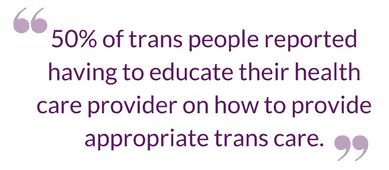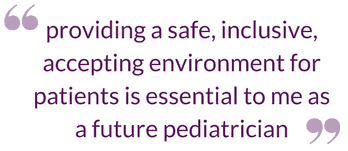When people hear “Alabama,” obesity, poverty, extremist religious views, Roy Moore, and STI’s may come to mind. Not exactly positive things. While my home state doesn’t necessarily represent equality, choice, or social justice, I have been lucky enough to be part of a class of medical students who (for the most part) do. My peers and I are not only advocating for fair and equal treatment of our future patients, including transgender patients, but also ensuring that those patients have access to appropriate care and control of their own health.
I attend the University of Alabama School of Medicine, which provides no formal training on treating LGBTQ+ patients, so students must seek out information provided by groups like MSFC and MedPride. MedPride is an organization of medical students, residents, allies, and physicians who inform students on LGBTQ+ individuals and their health, work to reduce stigma, and advocate for the rights of LGBTQ+ individuals. Our MSFC and MedPride chapters, along with a few other groups, recently held an event to fill these gaps in the curriculum and educate our peers on treating transgender patients. I represent MedPride as well as MSFC, and we knew this event was important because transgender youth are a vulnerable population.
 Alabama is not a receptive or supportive place for transgender individuals, and many patients avoid healthcare because of the fear of how they may be treated. Like other sexually active people, transgender people are at risk for STIs and unplanned pregnancies, but a third have delayed seeking preventative sexual health care due to the likelihood of being discriminated or disrespected. Plus, in a nationwide survey, 50% of trans people reported having to educate their health care provider on how to provide appropriate trans care. Medical students must understand that everyone, no matter their gender identity, has the right to control their body and have quality health care, including their family planning needs. We wanted to provide our fellow students with an open, judgment-free space to have their questions answered, clarify misconceptions, and provide information that will aid in the treatment of transgender patients in the future.
Alabama is not a receptive or supportive place for transgender individuals, and many patients avoid healthcare because of the fear of how they may be treated. Like other sexually active people, transgender people are at risk for STIs and unplanned pregnancies, but a third have delayed seeking preventative sexual health care due to the likelihood of being discriminated or disrespected. Plus, in a nationwide survey, 50% of trans people reported having to educate their health care provider on how to provide appropriate trans care. Medical students must understand that everyone, no matter their gender identity, has the right to control their body and have quality health care, including their family planning needs. We wanted to provide our fellow students with an open, judgment-free space to have their questions answered, clarify misconceptions, and provide information that will aid in the treatment of transgender patients in the future.
Our event focused on transgender and gender-variant youth. We collaborated with Nuts About Peds (our pediatric interest group), Psychiatry Interest Group, and the Office of Diversity and Inclusion (ODI). The panel was mainly made up of pediatricians, one general, one endocrinologist, and one psychiatrist, two of whom work at the transgender youth clinic held in the area. The panel also included a representative from a local LGBTQ+ organization that provides healthcare and community, including youth outreach. Having pediatrics, psychiatry, MSFC, and ODI involved helped students realize that regardless of their field, they will have transgender patients. They owe it to their patients to be as informed as possible about their care. 70 people attended, which is a great turnout in such a conservative area. We discussed how to make transgender patients comfortable and emphasized specific health concerns of transgender youth such as gynecological care, education on contraception options, and potentially storing sperm/eggs for future use in youth before they begin transitioning. The panelists highlighted that each patient is different and that physicians must allow patients to take the lead in determining what kind of medical transition they seek (if any). Attendees were very engaged and expressed interest in doing an additional panel to discuss the topic further.
Our efforts to educate our peers has caught the attention of the school administration. As a result, our curriculum may soon change for the better. ODI staff are currently creating an LGBTQ+ elective course that will hopefully be available soon. I’m proud to be a part of movement bringing education on LGBTQ+ health care to a public medical school in one of the most conservative states in the nation.
I wanted to host this event because providing a safe, inclusive, accepting environment for patients is essential to me as a future pediatrician. When patients come to my office, I want them to know every person they encounter has their happiness in mind and is an ally and resource for them. Reproductive rights and trans rights are important because every patient has the right to make decisions about their own body. Regardless of what specialty physician they see, patients should have access to the information and resources that they need. Events such as this one play a role in ensuring that future healthcare providers create a supportive environment for their patients and treat them with the respect that they deserve.
